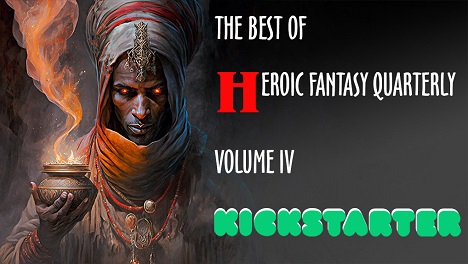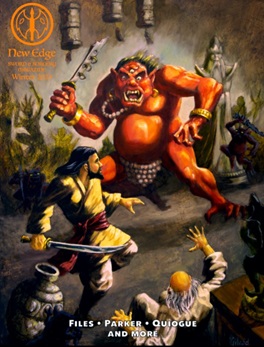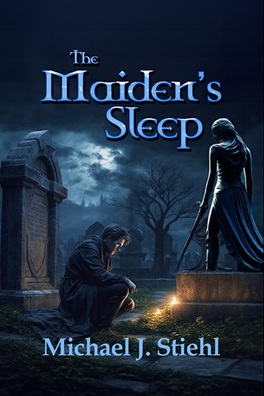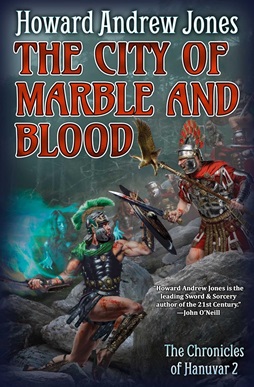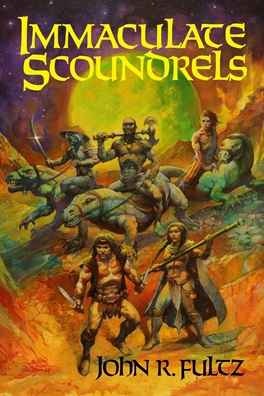THE DEATHS OF ALL WE ARE
THE DEATHS OF ALL WE ARE, by Liz Colter
Waking before dawn, I shift under the blankets that lie heavy on me; or is it soil covering me, nesting me deep and safe?
The stone floor beneath the rushes leeches cold into my bare feet when I rise. Pouring from a pitcher, I dip my cupped hands into the icy water, but pause partway to my face. The Great Mother Earth exhales deeply, a sigh of change. Her shifting pulls me entirely into Her world, the world of woods and streams. It must be a large change coming; Her beats of time tick too slowly to consider the small threats, a season of flood or fire. I shift with Her, like a sailor on a rough sea, one foot on the flagstones, one on the floor of Her autumn forest, and then I am wholly of the castle world again.
I finish readying myself so I may be there before my lady rises, to be on hand to dress her, to tell cook what she desires to break her fast.
Stepping into the hall, her husband emerges also from his bedchamber, which lies next to my lady’s own. He is fearsome in his black armor. His dark eyes — all that show beneath the raised visor — sweep past me. He is unaware of what I have felt. Did he know, he wouldn’t care; he is attuned only to threats to his wife’s lands.
The Earth shifts minutely as he pushes past, his armor brushing my arm, his musky scent filling my nostrils — a natural scent, more pleasing than the cloying perfumes of my lady.
My lungs full of him, I see a wolf dead in the woods, little more than a pelt. Sharp teeth have been bared by the drying skin of the lips. The bones of the chest show through great rents in the desiccating skin. Death. It comes for this Black Knight soon. I wonder if my lady will mourn him.
I enter her chamber. She sleeps still, unaware of her husband’s concerns; oblivious to my uneasy revelations. I add wood to the fire and take my place in the corner to wait, wondering if her husband’s coming death is what captured the Great Mother’s attention.
She stirs and I go to her, adjusting her pillows and offering her the chamber pot. Perhaps in her own blunted way she feels the change as well, for when she has dressed she says she will go to the fountain. We don our cloaks and I follow her into the garden, where the air is needle-sharp with autumn.
“Where has my husband gone, Luned?” she asks without turning.
“He was armored, my lady.” I need say no more.
The fountain resembles a rushing creek, splashing down boulders to a pool of unnatural stillness. Where the water comes from or goes to is a mystery buried in the magic of its making. I’m not sure that even the Black Knight knows why he guards it with such ferocity.
The Lady of the Fountain circles the frothing waters to the still pool at the far end. There, in childlike solemnity, she scries. Her brow furrows, her eyes are troubled. Perhaps she glimpses a hint of things to come, but the lines of her face deepen. She is perplexed, understanding little of what she sees.
We spend the day pretending to lengthen our needlework, both lost in thoughts of what the future may hold. Near evening, when my lady’s husband returns, I follow her down the winding stone stairs to the entry hall. He removes his helmet and the serving men flutter around him, unbuckling the straps of his armor. She reaches out to his breastplate, where blood glistens, nearly black against black. She stops short of touching it, seeing no rent, no wound. It isn’t his. He has proven victorious yet again.
A fortnight passes in peace. With no other quarry to pursue, the Black Knight leaves to hunt game. He returns late in the day with a boar over the rump of his destrier and a wounded badger over his lap. The boar has been killed with a single stroke. As for the badger, he makes of it a gift to his wife. He has given her no children and occasionally brings her small creatures needing care, believing it pleases her. It seems not to occur to him that a badger will make a perilous patient.
In this land where castles and servants, tapestries and fine clothing have caused so many to lose what is best of themselves, he remains a true child of the Great Mother, like myself. I hold neither affection nor dislike for my mistress, but this Black Knight is a kindred spirit. I hope his death will be as clean and quick as the ones he metes out.
#
The following day he is all in armor again. His lady and I watch from an upper window as he rides out to defend her land, black as onyx on his black horse. Perhaps thoughts of him stay with my lady, for she goes next to the badger. On a low shelf in the root cellar, where it was placed the previous evening, the creature has burrowed deep into its blankets. She lifts one edge carefully. Its wounds are deep and painful — the bites of some large predator — and it growls, eyes fixed on her hand.
“I have no time for this,” she says. “I must see to the staff while my lord is away. Tend the creature, Luned, and turn it loose when it’s well.” With that, she leaves me with the animal, as she usually does.
I squat near the large male, its body as wide and seemingly boneless as a great soft mound of dough set to rise. The sharp face and intent eyes belie the soft body. The Great Mother would have let fate take its course; his flesh would have fed another and his bones would have nourished the soil. But I have been given this task. I have the skills to help him, and so I do.
I remember life as a tree in the forest and feel my roots spreading into the earth. I remember being the soil itself, and a score of badgers walking my surface. They played beneath my boughs and dug their dens into my dirt, made soft by a century of pine needles and shade. Returning my awareness to the root cellar, I chitter to him in his own tongue. It soothes him and I stroke his triangular head in the way his mother would have licked his face when he was a cub. He closes his eyes, awash in sensations of safety, and I tend his wounds without trouble.
#
“The lord is home,” the chamberlain says the next afternoon, interrupting our spinning. His face is drawn and grave. “He is wounded my lady.”
She knocks the spindle from the wheel in her haste and it clatters to the flagstones, unspooling as it rolls. I wonder if our lives are about to unwind in much the same way. I follow her down the stairs to the main hall and out into the courtyard where the Black Knight sits his saddle, hunched forward, unmoving.
“My lord,” she says, touching his armored shin. He looks up then, and I see the wolf’s death upon him. Blood runs like a slow river from between the plates at his waist. It wends over his hip and drips to pool on the ground below his stirrup. The fabric beneath his arm is sodden at the source of the wound. A skilled challenger has slipped a blade into the gap under his sword arm. The bloody froth on his lips is proof it has pierced his lung.
“Get him down,” my lady snaps to the chamberlain.
It takes three men to lift my lord and he grunts with pain. His breath is wet with blood. The men rearrange their grips to carry him inside but the weight of him and his armor is great. They are making a second attempt when hoofbeats interrupt their task.
The man who rides in on a gray destrier is dressed in white with silver armor. The conceit has served him poorly for the horse is muddy, the linen is travel-stained, and the shine of the armor clearly shows smudges and dents.
He follows the trail of blood to the body stretched at our feet. Assessing his handiwork, he finds no further threat. Indeed there is not, for the last breath of my lady’s husband has drowned in his chest while we looked elsewhere. The man glances at the rest of us, finding little more to fear from us than from his slain enemy, but his eyes, when they reach the Lady of the Fountain, linger.
She isn’t wise. She has no special virtues, nor is she exceptionally talented in her needlework or singing. Her ability to scry is meager and comes only from her familial connection to the fountain. But she is beautiful, as all in her line have been. The Black Knight guards the fountain, but the lady lures the knight. It has always been so.
The knight dismounts, remaining within reach of his sword. “Was this your lord husband?” he asks her, indicating the dead man at his feet.
His eyes are close together, his face as heavy and soft as the greedy men of the castle worlds. But it isn’t my duty to judge, my duty is to the fountain. His will be also, though he knows it not.
She nods her answer, stepping back and nesting herself closer to the unarmed and nervous servants. We all share the same awareness; the knight before us has the strength and right to take what he desires: her possessions, her land, even the lady herself.
“I am Sir Ywain, son of Urien. I killed your husband as just due for the death of my loyal friend, Cynon, son of Clyndo, a fortnight ago.” A fortnight ago, when the Black Knight rode out armored and returned with blood on his breastplate.
She makes no reply.
“My lady,” I say. “You’ve suffered a great shock. You must rest. Allow me to see this knight fed and settled.” The sky has muted into the early shadows of late afternoon, and even she must realize it would be unwise not to offer him shelter.
The chamberlain lances me with a dark look for speaking in his place. I have supplanted his authority in front of his lady and this knight, and the chamberlain will not soon forget it. I answer to a power greater than the Lady of the Fountain, though, and far greater than this pompous man. This knight must stay.
“Do as you will,” she says, and turns for the castle entrance.
#
“Sir Ywain.” I gesture him inside while the chamberlain and his men see to the body of the Black Knight. He removes the sword from his saddle and follows me through the doors and up the stairs to a chamber overlooking the courtyard.
“What is your lady’s name?” he asks as we enter the room. He has not bothered to ask my own.
I help him remove the gorget from his throat as I answer. “Laudine, the Lady of the Fountain.”
“I’m surprised I haven’t heard of her. Her beauty alone should give her renown.”
He is smitten already, making my task that much easier. “She doesn’t leave her land, sir, and her lord husband prevented any from trespassing here. Few have seen her.”
“I see.” He muses on this as I unbuckle his breast and back plate. “No suitors will be calling then?”
“I don’t expect so, sir.”
“And what of family?”
“None, sir. Each in her line has had but one girl-child, usually late in life.”
He makes no answer, lost in thought.
“What king shall I tell my lady you serve?” I ask into the silence.
“A new king. Arturus.”
His hand is suddenly on my arm to keep me from falling. It amazes me that he could fail to feel the shifting of the Great Mother. My arms and legs tingle with the lightning-like sensation that accompanied that name. Arturus. My mind fills with images of fertile lands and flowing water. This king must be a true consort to the Great Mother, something not seen in many generations. And this knight serves him.
Ywain is as pale as a peeled turnip, with piggy eyes and heavy jowls. Divested of his armor, he bears a small paunch that shakes like suet. And yet there is none better to become the new Black Knight, the new guardian to the fountain which ensures the rains, and therefore the vitality of all life.
“Are you well?” he asks, still holding my forearm.
“It’s only that the events of the day have been trying.”
“Of course.” He releases my arm. “Go. I can manage the rest of my armor.”
I nod and close the door behind me, the easy half of my task accomplished.
#
I go next to my lady’s chambers. She looks small, half-consumed by the bed and the thick bedding on which she lies. I sit next to her and take her cold hand.
“Did you see how he looked at me, Luned?” she says. “What will I do?”
“What has always been done, lady. There have been many black knights over the centuries, now there will be one more.”
She stares in horror. “I cannot marry him. You must find a way to make him go.”
Had Ywain been fair, would her reaction be the same I wonder? She must agree to this and we both know it, and yet we play the game.
“How many men did your lord husband kill to guard the secret of the fountain?” I ask.
“A score, at least.”
“And how many times was he wounded?”
“Never.” Her voice is fierce with a pride she never showed while he lived.
“And this knight bested him.”
That gives her pause.
“It is the way, lady. When one stronger comes along, he becomes the new Black Knight. For your sake and the sake of the fountain, you must accept him.”
She says nothing, but I see my words at work. Her purpose — the purpose of her entire line — has been to ensnare the undefeatable. For her land to be without a guardian must feel like her heart has been cut from her living chest.
I leave her with these thoughts and close the door to her room softly. Turning, I find the chamberlain arm’s length from me. Was he arriving as I left her room or has he only now stepped back from the door? I nod, giving him due as head of the servants, and he steps past me and down the hall without speaking.
#
Ywain doesn’t leave in the morning, as I knew he would not, and after checking on my lady I go to his chamber. He asks to see the fountain for which the lady is named before he has even broken his fast. Under the sharp eye of the chamberlain, we pass through the entry hall and outside.
I lead Ywain first through the gardens and then the trees to the well-concealed place in the woods. I watch him for any sign of a connection, any bond to the fountain — instead, I see greed. He views it as a wondrous thing to possess, nothing more. I wonder if perhaps the previous Black Knight was the same at first.
The Great Mother breathes a sigh, a cool breeze that raises the fine hairs of my body into goose-flesh. The prickling makes my skin feel that it’s pulling apart into tiny pieces. And then it does. I scatter, drifting on Her wind like fine sand. No, like ash.
“Take me to the stables,” Ywain says. “I wish to ride the perimeter of the land.”
His voice reminds me of who I am in this castle world, but it is a moment before I collect myself. He doesn’t notice. He can’t see my other self swirling on the currents.
I accompany him to the stable where his pale horse is boarded in the stall beyond the black’s. The gray is dull and dirty but the black’s coat shines like polished obsidian. His muscles flex like flowing steel as he shifts weight from one hind foot to the other and turns his head to observe us pass behind. Ywain pauses and runs a hand down the glossy midnight rump.
“I think I’ll take this one today,” he tells the stable boy who has crept from the shadows. I hide my smile.
The chamberlain glares when I return. He must have seen Ywain ride out on our former lord’s horse and, again, must think I seek to gain the greater favor with the new knight.
Ywain returns at mid-day and the chamberlain plays his own hand. He sends for the boy to take the horse and asks Ywain if he wishes his afternoon meal in the hall or in his chambers. Ywain chooses the hall and asks if the Lady Laudine will join him. The chamberlain bows and smiles, then gestures to me. “I will have Luned fetch her at once.”
The chamberlain follows me to the foot of the stairs where he corners me. “Since your influence with our lady is so great, you will summon her to dine with her husband’s murderer.” His belly touches my own, so close does he stand. “You’ve overstepped yourself, Luned, and I’ll be there to see you fall.” Spittle dots my upper lip as he speaks. He does not step back to let me by, forcing me to edge past.
I’m only half surprised to find my lady washed and dressed. She must have spent hours in front of her reflection applying powders and perfumes, curls and pins, far more expertly than I could ever have managed for her. It is one thing at which the women in her line truly excel, and she is as radiant as a rising sun.
With the crochet hook on her dressing table, I finish the upper buttons of her dress. She knows her destiny as well as I, and descends the stairs like a queen. Ywain stands at her approach, awed. The chamberlain’s face falls at my success.
Ywain escorts her to her seat. Soft and greedy he may be, but he is well-bred and capable of surprising charm. The chamberlain and I stand — he near Ywain and I near my lady — while Ywain regales her with tales of Arturus’s court and his faith that Arturus will rise to High King within a year. The stories have their effect, and the Lady Laudine’s eyes shine brighter with each new boast.
Across from me, though, the chamberlain’s eyes darken. The fear that I seek to supplant his power in this household is writ plainly on his face. As if I would ever wish that for myself.
The following fortnight reveals the depths of his malice.
#
A wedding date is quickly set. The closer Ywain circles to his new title and lands, the more the chamberlain fawns over him. We vie for the knight’s attention; I to transform Ywain from what he is to what he must become — the chamberlain from his pettiness.
I visit the badger each day, when Ywain and my lady are otherwise occupied. Today I find him on the floor of the root cellar, snuffling at the crack below the door, ill-tempered and ready to be free. I sympathize. I am whatever the Great Mother makes me, yet this life is artificial and cloying compared to the vastness of my other world. There I can feel the wind sighing through my outstretched boughs, new life growing within the belly of my soil, water sluicing over the rocks, my bones.
The badger has no patience for me to stroke his head today. He is well enough and I open the door and give him his freedom, wishing someone could do the same for me. He waddles through the courtyard and I follow, to make sure no one harms him before he escapes the castle grounds.
We pass near the huntsman’s cabin on the way into the woods. The huntsman has recently returned, and I hear Ywain finishing a conversation on local game and he and the chamberlain taking their leave. The door opens as I pass, the badger scuttling before me. I nod and point to the creature, saying I’m shooing him back to the woods rather than the truth that I escort him.
“My lord,” the chamberlain says as I pass the far side of the cabin — already he calls him “lord.” He speaks loudly enough for me to hear, intentionally, I’m sure. “Do you see the truth of my earlier words? She is not a natural woman. The badger is a familiar.” He is unaware that his lies contain a grain of truth. I am no ordinary woman, though I am more natural than he could ever know.
Ywain waits to hear more and the chamberlain obliges.
“I worry for you, my lord. She is fickle. And powerful. Her influence with the lady has grown out of all normal bounds.”
I cannot linger without seeming as suspicious as he paints me, but the chamberlain’s prattling continues to reach me over my quiet footsteps.
“If the wind changes and she turns against you, my lord, she could turn the lady against you — if not with words, then by other means. It is dangerous to keep her near. And there is only one way to deal with such as her.”
The badger and I are into the woods now and I cannot hear the final words, though I know what they will be: “You must burn her.”
The badger waddles on into the ground cover, disappearing without a glance of thanks. It brings to mind the previous Black Knight, of the qualities of nature that he possessed that made him such an excellent guardian of the fountain.
This Ywain yet wears his white and silver, thinking it courtly and impressive. He has no true connection to the fountain, though he visits it more frequently each week, intrigued by the mystery of the flowing waters without beginning or end. I must find a way to bind him soon. His ties to the fountain must be as enduring and loyal as his ties to his king.
#
In the end, it is only the chamberlain’s men who come for me. Landowners are a law unto themselves in these times when foreign nations have abandoned control of the isles, and the multitude of kings sprouting in that fertile ebb are little more than pillagers and land barons. Those who escort me to my prison are Elwyn the woodcutter, Cynbel the chamberlain’s assistant, Maddox the huntsman, and young Huey, the stable boy.
Neither Ywain nor my lady have shared with me that I’ve been accused, nor come to ask my defense. I’m unsurprised by this; Ywain will not risk any barriers to his desires, real or imagined, and strength has never been the Lady Laudine’s suit.
The chamberlain gloats as I’m taken past him and locked in the same root cellar where the badger was kept. Thankfully, the animal’s blankets are still there to help stave off some of the chill. Perhaps I should revel in the cold air, though, for I fear I will not be cold much longer.
From the cellar I can hear Elwyn hewing logs and the men stacking my pyre. I trust my Great Mother and yet it’s hard not to doubt. What does it mean that I haven’t accomplished all I should? The fountain is essential to the land, but the Great Mother moves in such wide circles that a tiny part of Her, such as I, may go unnoticed. Perhaps I’ll die without intervention, overlooked in Her greater considerations of eons.
Late in the day, my lady comes to me at last.
With a retinue outside the door objecting, she enters my dark cellar alone. In that moment of light she is haloed in glory, more beautiful than ever, before she closes the men and the light out behind her. I wait for her to speak.
“You have been a strange and distant girl, Luned,” she says, “and I was convinced by my betrothed that we should do this thing. But as the hour grows near I find I’m less sure.”
Less sure maybe, but she will never demand the sentence be remanded. “When will it happen?”
“At dawn. I have come to say goodbye.”
I wait in the darkness.
“Is there anything I can bring you to ease your last night?” she asks.
“No, lady.” I am thirsty but perhaps, like a tree, I will burn faster if I am dry. “There is one boon I would ask, though.”
“Ask then.”
“Sir Ywain has ordered the death of your innocent and loyal servant. Would you request that he honors me by wearing black at my burning?”
She considers. “I will do this for you.”
The lady leaves, and I harbor a tiny hope in the darkness.
#
In the morning, they remove me from the cellar. The sun is not yet over the horizon but the stars have faded from the heavens and the autumn sky is bruised with the coming dawn.
My hands are bound behind me and I’m led to a stack of wood and lashed to the upright stake in the center. The chamberlain is there early, but my lady and her knight emerge from the castle last of all.
She is in pink, as pale and delicate as the dawn clouds on the horizon, but Ywain is all in black. My heart soars with this small victory. Another step has been taken. I can see the pride in his bearing that wearing the daunting and unfamiliar color brings, and I know he will not put off the black again. It is not enough to bind him to the fountain, but I’ve done what I can.
The chamberlain himself lights the wood at my feet. It catches slowly at first and then burns faster. My lady returns to the castle, unable to watch. The chamberlain, my accuser, is eager. Ywain, my judge, stoically sees through what he has decreed. The others watch in fascinated horror, even young Huey.
They expect me to scream. I, too, expect to scream, but I don’t. The Great Mother protects me as she takes me back to her bosom. She has not forgotten me after all.
The heat is tremendous but I burn with a terrible dryness, not the agony of flesh and nerve. The flames begin at my feet and quickly blaze to my knees. My dress catches and flares in a golden burst of greedy fire. It finds my hair.
I wither like burned grass. I sear like a charred tree. I scorch like the earth. My thirst becomes unbearable as I parch and desiccate, and yet I’m as protected from pain as bark, or soil, or rock.
Ywain watches without expression. Dressed all in black, so emotionless, he resembles the previous guardian of the fountain strongly now.
My skin blackens and flakes but my awareness remains. With the last of my eyesight, I see the ash of my flesh float on the wind the fire engenders. It drifts toward Ywain and beyond him to the fountain. My ash dusts his light hair and skin, darkening them slightly. Bits of myself enter his mouth and nostrils and I feel myself breathed deeply inside him. I appreciate anew my Great Mother’s wisdom as my nature becomes a part of this new Black Knight.
The rest of me scatters to the forest, to rest for a time, returning me to what I love. The Great Mother regenerates her children constantly, using them in many ways. When there is a new Black Knight someday, perhaps I’ll return again to this form.
Perhaps I always do.
________________________________________________
Due to a varied work background, the author (who writes novels under the name L. D. Colter and short stories as Liz Colter) can claim a moderate knowledge of harnessing, hitching, and working draft horses, canoe expeditioning, and medicine. She’s also worked as a roller-skating waitress and knows more about concrete than you might suspect. Her stories can be found published or upcoming in Galaxy’s Edge Magazine, Pseudopod and Daily Science Fiction, as well as her contest winning story in Writers of the Future. Her debut novel “A Borrowed Hell ” was published earlier this year from Shirtsleeve Press. A complete list of her published works can be found at her website: http://www.lizcolter.com/
